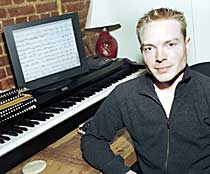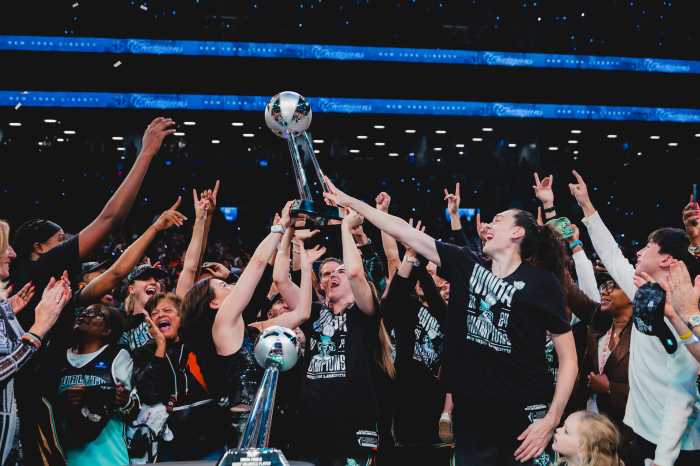It’s almost like a terrible mistake was
made," says composer John Mackey, laughing, about the world
premiere of his latest work, which will be performed by the Brooklyn
Philharmonic Feb. 21-22. "I’m with some amazing company
on this program."
That program is "American Lollapalooza," a smorgasbord
of music written in the past three decades by several American
or American-based composers.
The program gets its title from John Adams’ "Lollapalooza,"
which closes the concert. Preceding Adams’ work – as rollicking
as its title promises – are works by fellow Americans Michael
Daugherty ("Route 66"), seminal iconoclast Steve Reich
("Three Movements"), Aaron Jay Kernis ("Musica
Celestis"), Mackey (the 10-minute "Redline Tango")
and Swiss-born, New York-based Daniel Schnyder ("Hymn for
a New Generation" in its local premiere performances).
Distinguishing the program as another example of the Brooklyn
Philharmonic’s fearlessness under music director Robert Spano
are several things – rarely does a living American composer get
a hearing in the concert hall nowadays, let alone five in one
shot; rarely is a rock song heard during a classical concert,
let alone two (Jimi Hendrix’s "Purple Haze" in Schnyder’s
arrangement, and, as an encore, Black Sabbath’s "Paranoid,"
arranged by Gene Pritzker); and rarely does a conductor who’s
known as an advocate of the blurring of the boundaries of classical,
rock, jazz and other kinds of music get to conduct a first-rate
symphony orchestra.
But Estonian-born Kristjan Jarvi – founder of the innovative
contemporary group Absolute Ensemble and son of eminent conductor
Neeme Jarvi – will be on the podium for these concerts, which
promise to further the Philharmonic’s image as a risk-taker amid
the usual staid, dry classical programming.
"The program is very influenced by pop music," Mackey,
29, notes, and he’s not saying that simply because of the presence
of Jimi and Ozzy. "For example, my piece has a hi-hat, which
is a basic part of a rock group’s drum kit."
Daugherty has also acknowledged rock as a major influence on
his work and Reich’s rhythm-oriented style can also be heard
in pop and rock music.
Mackey lists his own influences baldly, and they rarely include
musicians without electronic instruments. "I love [the hard
rock group] Tool," he admits, "but there’s really not
a whole lot of Tool in my new piece. I like rhythmically complicated
rock, and some fun stuff like Linkin Park."
After pausing, he states the naked truth: "I rarely listen
to classical music."
So how did Mackey’s "Redline Tango" get commissioned
by the Brooklyn Philharmonic? The composer, who was recently
appointed music director of the Parsons Dance Company in Manhattan,
relates its genesis: "I’m good friends with Graham Parker,
former general manager of the Brooklyn Philharmonic, and he recommended
my music to the group.
"My music was also reviewed by Kristjan Jarvi, who had spoken
with some of the members of Absolute Ensemble, and they had told
him he should check my music out. He did, they agreed to commission
a work, and here we are."
Hearing the title "Redline Tango" makes one hopeful
there’s a good explanation behind both title and composition,
and Mackey doesn’t disappoint. "The title comes from ’redlining’
an engine, which means pushing a car engine to its limit. And
that’s what we do: the piece is full of energy, it starts out
fast, gets very loud and winds up fully intense by the end."
And where does the tango fit in?
"There’s a very sultry tango in the middle," he says,
"which comes from the same musical material that’s heard
at the beginning of the piece."
Mackey also says there’s another meaning to his title. "On
a more personal note, the red line is also the 2 or 3 subway
trains that I take when I go to BAM," he says. "When
I told my friends that, they said that I was reaching, but it’s
true!"
When Mackey said that he was amazed to be part of this program,
he wasn’t joking.
"It’s the first time a professional orchestra is doing my
music," he says. "I’ve worked with a lot of youth orchestras
over the years, so it’s an exciting opportunity for me to compose
music for professional musicians. I could write whatever I wanted
to write and not have to worry about whether the musicians would
be able to perform it."
The result of such a liberating experience can be heard at BAM
this weekend.
The Brooklyn Philharmonic Orchestra
performs its "American Lollapalooza" program at the
BAM Howard Gilman Opera House (30 Lafayette Ave. at Ashland Place)
Feb. 21 and Feb. 22 at 8 pm. Tickets are $20, $35 and $55. For
more information, call (718) 636-4100 or visit www.brooklynphilharmonic.org
on the Web.























